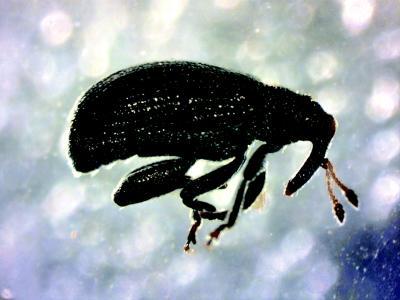A pest that pre-science farming could never conquer has returned to torment the modern organic kind. While conventional pesticides, which were created to defeat pests and blight a laissez faire approach to growing could not, kill Orchestes pallicornis, the apple flea weevil, just fine, things are not looking good for organic apple orchards in Michigan, where outbreak population levels have been observed since 2008, and damage has resulted in up to 90% losses for those apple growers. A hundred years ago it was only a sporadic pest but science has been taming agriculture since 1835 so its impact was limited. Left unchecked, it could become a major issue.
The apple flea weevil is a small, 2-3 millimeter black weevil with enlarged high legs for jumping. Adults feed on buds and leaves, and the larvae are leaf miners. There are currently no proven management options for use in organic production and as broad-spectrum materials are replaced by reduced-risk compounds, it is possible that the apple flea weevil will increasingly become an important pest in apple production.

Adult Orchestes pallicornis (apple flea weevil). Credit: © 2012 Entomological Society of America
In a new article, the authors discuss the apple flea weevil's biology and the damage it does to plants, as well as methods for growers to monitor and manage them.
Citation: Nielsen, Anne L.; Pote, John; Buehrer, Krista; Grieshop, Matthew J., 'The Reemergence of an Old Pest, Orchestes pallicornis (Coleoptera: Curculionidae)', Journal of Integrated Pest Management, Volume 3, Number 3, 2012 , pp. D1-D4(4) DOI:10.1603/IPM1200 (Open Access)






Comments